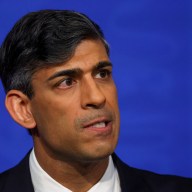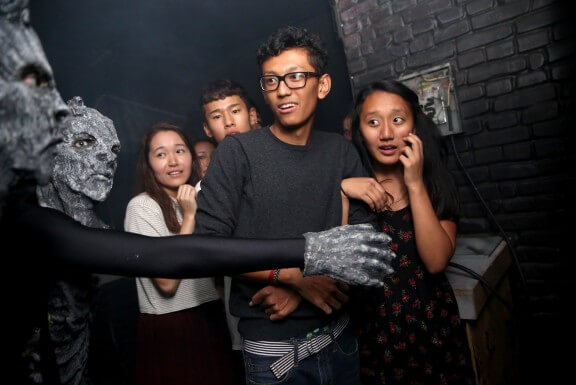 John Cassavetes and Gena Rowlands’ last screen pairing was in “Love Streams,” one of the former’s funnier films.
John Cassavetes and Gena Rowlands’ last screen pairing was in “Love Streams,” one of the former’s funnier films.
Credit: Criterion Collection
‘Love Streams’
The Criterion Collection
$39.95
John Cassavetes’ reputation as a filmmaker is as a chronicler of raw truth. His handheld cameras zoom in and hold on the faces of anguished people, shoving viewers’ faces in the real. That’s not so accurate. Cassavetes’ characters and his world are as stylized as a Wes Anderson film, his actors goaded into becoming heightened, exaggerated caricatures from whose mouths spurt endless chatter. They don’t, in the words of a line from “Austin Powers,” have inner monologues; they say whatever they’re feeling, and they’re not always sure what they’re feeling.
None of this, it should be noted, is a knock; it’s a compliment. In fact, Cassavetes’ films, even his painfully serious ones like “Faces” and “A Woman Under the Influence,” are secretly comedies. And his full-on comedies are hysterical. “Love Streams” isn’t a straight-up comedy. (The closest of his films to that description is, maybe, “Minnie and Moskowitz.”) It’s closer to a dramedy, superficially similar to the recent “The Skeleton Twins.” In Cassavetes’ last screen pairing with wife/regular Gena Rowlands — and his second to last film period before his 1989 death — the two play siblings. Robert’s a pop novelist and playboy wrestling with aging and other anxieties; Sarah’s a recent divorcee whose daughter has decided to stay with her soon-to-be ex (Seymour Cassel, rocking one of cinema’s great ’staches).
She goes to stay in his L.A. manse (in fact, the Cassavetes’ own manse), but this reunion is pushed off till after the hour mark in a film that runs 141 minutes. And we don’t even know the nature of their relationship until they’re actually together. They could be exes for all we know, and that certainly seems likely. But they share a common restlessness that only relatives have — an inability to put a cork on their roiling neuroses. Sarah, as it happens, is a wreck — perhaps not on the level of Mabel in “A Woman Under the Influence,” but certainly even moreso than Myrtle in “Opening Night.” She can barely speak without interjecting some nervous aside, and every interaction is a struggle. When she whimsically decamps for France, simply finding someone to help her with her luggage is a Herculean challenge.
 Gena Rowlands buys a bunch of animals for kicks in “Love Streams.”
Gena Rowlands buys a bunch of animals for kicks in “Love Streams.”
Credit: Criterion Collection
Unlike “A Woman Under the Influence,” Sarah’s problems are funny — sort of. There’s real pain in the film; it’s about someone abandoned, not only by her husband — Cassel has never been more cold, playing some who’s firmly decided he’s no longer available to Sarah — but her daughter. Yet the tone is arch, manic, absurdist. Sarah’s attempts to worm her way back into her family’s life are desperate but Chaplinesque comic set pieces. Robert’s side of the film, meanwhile, is straight-up silly. He’s not just a playboy — his home is constantly filled with reams of scantily clad or naked young women. He can’t even go to the bathroom without finding two of them in his shower. For a stretch of the film he welcomes into this den of sin his young, estranged son. Perhaps in “Faces” this would have wrought painful, intense scenes of miscommunication. In “Love Streams,” he thinks nothing of giving him booze and talking adult topics.
“Love Streams” is commonly referred to as Cassavetes’ proper final film, as his actual final film was 1986’s “Big Trouble,” a sequel-in-spirit to the 1979 comedy “The In-Laws” — featuring the director’s sometime star and castmate Peter Falk, plus Alan Arkin — on which he came late and subsequently disowned. Yet the tone and feel of “Love Streams” isn’t that far from the rough and tumble (and sometimes very funny) “Big Trouble.” There are many leftfield bursts of goofiness, as when Sarah convinces herself it’s a great, not unbelievably terrible, idea to buy farm animals and taxi them to Robert’s home. Even the way Robert spends a chunk of the final stretch wearing a silly straw fisherman’s hat speaks to the way spirits were, at least for Cassavetes, up.
In fact, “Love Streams” was conceived, at least by trash producers Menahem and Yoram Globus, as his mainstream breakthrough. One can sense in “Love Streams” a giddy, anything-goes mentality — as though Cassavetes was unusually inspired to do whatever he wanted. He tries things you’d never expect from a Cassavetes film, most notably an actual mini-operetta in the final stretch, shot on a stage with dancing and Rowlands singing and everything. Even for a Cassavetes film, there’s no resolution, and sometimes not even a shape. Lovers, supporting characters — notably Robert’s singer gal pal, played by Diahane Abbott (the then-Mrs. Robert De Niro) — drift out of the picture unannounced. Understandably, “Love Streams” was not the monster hit the Golans imagined; it was barely released, and some of its video releases have been shorn of over 15 minutes. It’s Cassavetes’ most unwieldy film, but unwieldy, for Cassavetes, is a good thing. However chaotic and nutty his penultimate film can be, it’s always anchored by its vivid and deeply-lived sense of pain — but in a funny way.
Follow Matt Prigge on Twitter @mattprigge

















